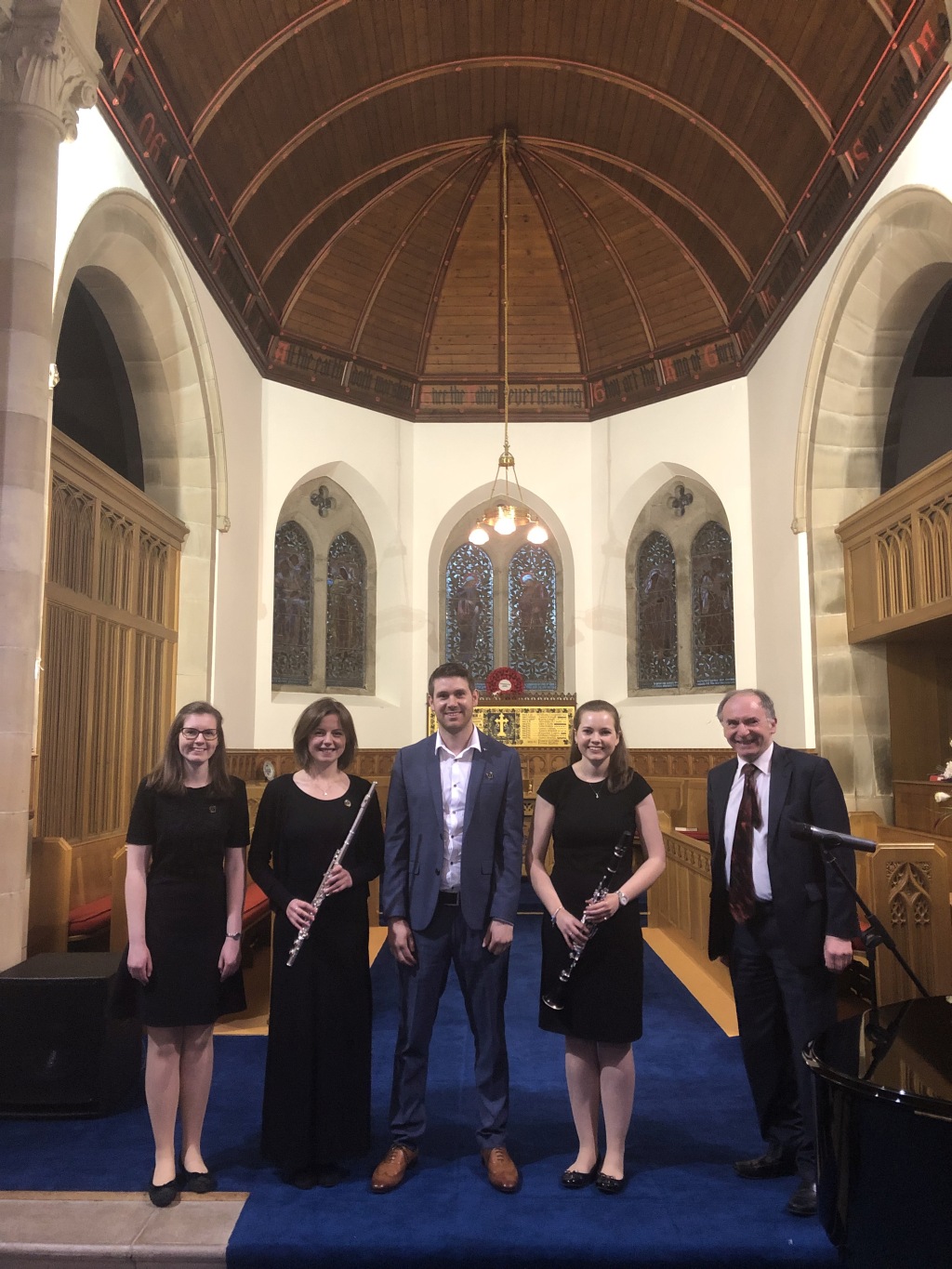click here


Introduced by Colin Brockie, NESMS Manager
Exactly a year on from last year's Scholarship Concert, because of a change in the time of the Scholarship auditions designed to fit in with the academic year, this year's event was unique in that the four performers were winners from previous years, all now pursuing successful musical careers.
The first to perform on Friday was clarinettist Emma Barnett who last performed in a Scholarship Concert in 2014. Very attractive music, rich in melodic appeal marked all three of her pieces in the first half of the concert. She opened with the 'Prelude' from Five Bagatelles by Gerald Finzi. Bright, clear playing with smooth flowing delivery of Finzi's lovely melodic writing got the performance off to a totally uplifting start. Emma continued with the luscious second movement of Ludwig Spohr's Concerto in Eb. Accompanist Harry Williamson who had given us the most attractive melodic underscoring in the first piece surprised us all when he moved to the organ to accompany the Spohr Concerto. I thought this worked spectacularly well. His delicate light-fingered playing suggested the orchestral backing that the composer had wanted. Here again in this piece, Emma's lovely smooth playing unfolded the slow melodic content to perfection – absolutely delightful!
Emma concluded her first half offering with Two Majorcan Pieces by Joseph Horovitz. For these, Harry moved back to the piano. This was delightfully happy music. The first had a kind of folksy Spanish flavour with a jaunty rhythm. The second, brisk and more needle-like with a busy running rhythm from both clarinet and piano, was really enjoyable.
In the second half of the concert, Emma began with two movements, 'Prelude' and 'Summer' from Paul Reade's The Victorian Kitchen Garden a real clarinet favourite which has long outlived the TV programme for which it was the background music. To follow, Emma – yes and Harry too – launched into a helter skelter performance of Malcolm Arnold's Scherzetto, jolly and full of musical glee.
The second performer on Friday was pianist Isabella Cook who last appeared in a Scholarship Concert in 2011. Isabella opened her offering with J. S. Bach's Toccata in G Major BWV 916. The work contains far more than the title would seem to suggest. It is actually in three very different movements. The first, 'Allegro', begins with rapidly descending scales that sounded like chiming bells and the following chords were very much a carillon. The second movement, 'Adagio', had fine counterpoint and within it, a rather attractive melody. The finale offered an exciting contrapuntal gigue. Should Bach's music be played on the piano? Well, why not. I remember when the BBC broadcast all the Preludes and Fugues performed by several well known pianists. I thought Isabella's playing lived up rather well to that and she brought out many expressive details in her performance that sounded both fresh and exciting.
To follow, Isabella offered Schumann's Arabeske op. 18. It takes us through a changing series of contrasting moods and in her playing Isabella led us through these with remarkable fluency and freedom.
In the second part of the concert she played three extracts from Prokofiev's Romeo and Juliet op 75. These pieces have very different colours and emotional punch but I felt that the piano version does not have the range of colour you get from the orchestra. I remember Gergiev's performance at the Edinburgh Festival of all the music from the ballet. It was rather long. I was sorry that Isabella was required by pressure of time to omit Chopin's Waltz in A minor – some other time perhaps?
Flautist Kirsty Campbell last appeared in a Scholarship Concert in 2017. Her choice of opening piece was Handel's Sonata in G Major. Once again Harry Williamson moved to the organ for the accompaniment and here too it worked spectacularly well. I found Kirsty's performance light and full of elegant refinement. It was originally written for oboe but was transposed by an unknown hand into G for flute and continuo. It has five movements both slow and fast and in both, Kirsty's playing had expressive phrasing and detailed attention to rhythmic detail.
To follow, she played a less well known piece, Im Silberkranze (Wreath of Silver) by Carl Reinecke. In this, she made the flute float attractively over Harry's very fine piano accompaniment. Kirsty's final piece in the first half of the concert was Fantaisie by Gabriel Fauré. Here too the playing was elegant, bringing out the melody and in the faster section there was a fairyland lightness to both flute and piano.
It was Kirsty who was chosen to round off the concert in the second half with Cantabile et Presto by George Enesco (or Enescu if you prefer the original Romanian spelling). This was a challenging piece and in many ways it was Kirsty's finest performance. It rounded up the performance so well.
The final performer, bass baritone David Ferguson, last sang in a Scholarship Concert in 2013. In the first half of the concert he chose what rank among the finest of English songs in the repertoire beginning with Silent Noon by Vaughan Williams, his setting of words by Dante Gabriel Rosetti. It was interesting that in the Song Section of Cardiff Singer of the World last night, the Welsh mezzo Angharad Lyddon sang this very piece but in her performance, I did not catch the words at all though I did manage to follow the text in David's performance. The words are so delicious that this really mattered.
David's diction in the following set of the five songs from Finzi's Let us Garlands Bring was also very clear. Here the texts are taken from plays by Shakespeare. The opening song is rather sombre but all the others are upbeat. I particularly liked 'Fear no more the heat o' the sun'. David opened the second half of the concert with Schubert's An die Musik; it worked especially well with its range well accommodated to David's vocal range.
Near the end of the concert, David sang two very dramatic arias from Verdi's operas Simon Boccanegra and Banquo's aria from Macbeth but these really are rather dark. Perhaps being that this was so near the end he could have chosen one of the more comical or light-hearted bass arias. Still, well done David: thank you and all the other performers for giving your time and talents to support this very special NESMS Concert. Oh, and as Colin Brockie said at the end, a special thanks to our marvellous accompanist Harry Williamson. As I said, I watched the song final in the Cardiff Singer of the World and was most impressed by their piano accompanist Llyr Williams. He was good, but only played the piano. Harry Williamson covered an equally wide range of music and with him we got organ as well!